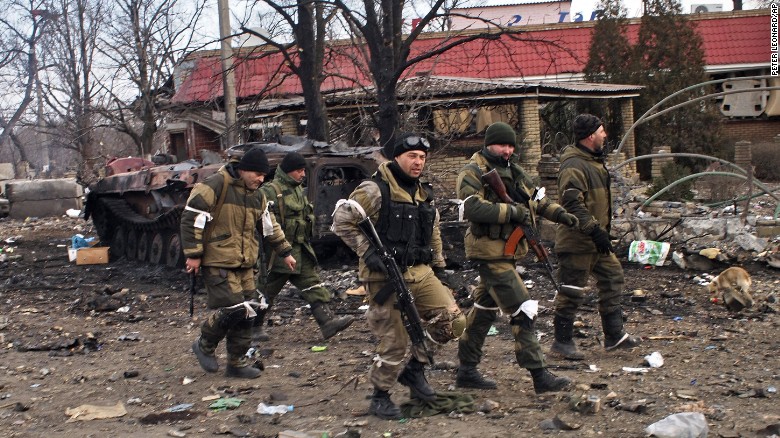
U.S. Secretary of State John Kerry had strong words Saturday for Russia over what he called its unacceptable actions in Ukraine — and threatened additional sanctions against Russian interests. Speaking in London alongside UK Foreign Secretary Philip Hammond, Kerry said Russia was “continuing to do land-grabbing in Ukraine” even as it professed to support peace efforts. Russia’s actions are “just simply unacceptable, so we are talking about additional sanctions, additional efforts,” Kerry said. “We are confident that over the next few days we are going to make it clear that we are not going to play this game, not going to sit here and be part of this extraordinarily craven behavior at the expense of the sovereignty and integrity of a nation. “This is behavior that is completely counter to everything that the global community has worked to achieve and put in place ever since World War II, and I’m confident that the United Kingdom, the United States and others are prepared to stand up to it.” He blasted Moscow’s repeated denials that it is involved in arming the separatists and sending its own troops over the border. In this age of technology and satellites, Kerry said, “there is no secret” over what is taking place. “We know to a certainty what Russia has been providing to the separatists, how Russia is involved with the separatists,” he said. Kiev and a number of Western leaders have steadfastly accused Russia of failing to rein in separatists and of continuing to arm, supply and train them. European nations, the United States and others have imposed financial sanctions on Russian interests in hopes of pressuring President Vladimir Putin to help end the hostilities. Russia, which seized Ukraine’s Crimean peninsula in March, denies any direct involvement in Ukraine and says any Russian soldiers in Ukraine are volunteers fighting during their vacation time. Debaltseve siege most deadly Kerry’s remarks come as a ceasefire which came into effect last Sunday remains in serious doubt. A fierce separatist offensive to take the key strategic town of Debaltseve ended only Wednesday, when Ukrainian soldiers were forced to retreat. Yuriy Biryukov, a presidential adviser and assistant to Ukraine’s defense minister, said Saturday that 179 soldiers had died in the Debaltseve area between January 18 and February 18. An additional 110 soldiers were captured and 81 are missing, Biryukov posted on Facebook. Some of the missing are still on their way out of Debaltseve, he said, while others have died. Late Saturday, Ukrainian President Petro Poroshenko said 139 Ukrainian soldiers had been released from captivity. The release was part of a prisoner swap between Ukrainian and rebel forces in the eastern Donbass region; 52 pro-Russian separatists were also freed, according to Russian state news agency Itar Tass. The toll makes the siege of Debaltseve — a town now shattered by heavy shelling — the Ukrainian military’s deadliest single incident over the past 10 turbulent months. Shelling has also picked up this week in Donetsk city and clashes are reported around the southern port city of Mariupol. Ukraine’s National Defense and Security Council said Friday there had been 300 instances in which this latest truce has been violated. The ceasefire agreement — signed February 12 in Minsk, Belarus, among the leaders of Ukraine, Russia, France and Germany — aimed to curb this violence. It is supposed to be followed by the withdrawal of heavy weaponry to create a buffer zone, the release of prisoners and steps toward new elections. Months of devastating fighting has left nearly 5,700 people dead as of February 18, the U.N. Office of the High Commissioner for Human Rights reported Friday. More than 1 million people have been displaced. NATO deputy leader: Russia poses existential threat In a speech to a London-based defense think-tank, the Royal United Services Institute, Britain’s senior officer in NATO warned that Russia’s expansionist ambitions could pose an “existential threat” to the world. Russia is currently employing a “hybrid combination” of “coercion through rapidly generated conventional forces and subversion, through a number of means, both military and non-military,” said Gen. Adrian Bradshaw, NATO’s Deputy Supreme Allied Commander Europe. This hybrid strategy can be used to set the scene for a “subversive takeover of territory,” as seen in its takeover of Ukraine’s Crimean peninsula last year shortly after large-scale military exercises by Russia on its side of the border, he said. “We are today seeing conventional forces employed, albeit subject to continued brazen denials by the Kremlin, in eastern Ukraine,” he added. Russia’s new strategy holds particular dangers for NATO, he said. Firstly, the use of subversive tactics initially makes it difficult to identify clearly “the hand of a hostile state government” in destabilization of a country, making collective decisions harder. Secondly, its ability rapidly to generate large scale forces “could in future be used not only for intimidation and coercion but potentially to seize NATO territory, after which the threat of escalation might be used to prevent reestablishment of territorial integrity,” he said. And, Bradshaw pointed out, Russia is not the only threat to NATO states, citing also the danger posed by terror groups such as ISIS, also known as ISIL. “Whilst the threat from Russia, together with the risk it brings of a miscalculation resulting in a slide into strategic conflict, however unlikely we see that as being right now, represents an obvious existential threat to our whole being, we of course face threats from ISIL and other instabilities to our way of life and the security of our loved ones.” — www.cnn.com

